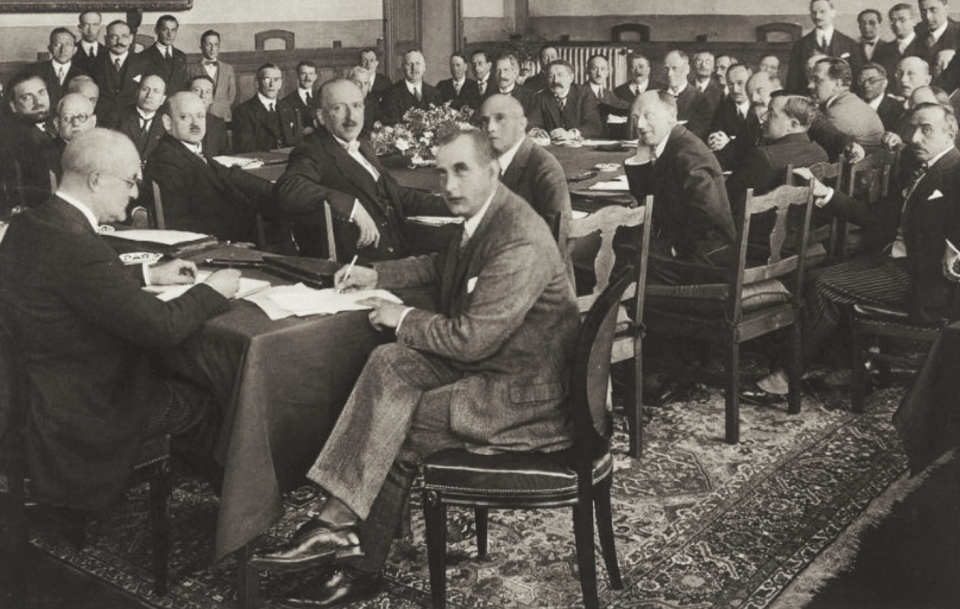The 100 years of the Locarno Conference
From 5 to 16 October 1925, the city of Locarno hosted a conference of the European Ministers of Foreign Affairs, who signed a series of agreements aimed at bringing together the victorious and defeated powers of the First World War. The most important of these treaties was the Pact of the Rhine, in which Germany recognised its western border as established by the Treaty of Versailles. Great Britain and Italy guaranteed its inviolability. «The Locarno Pact was a fundamental regional security agreement that stabilised Europe in the post-war period until Hitler seized power», explains the Director of Dodis, Sacha Zala.
«The greatest courtesy lies in discretion»
At the start of the conference on the straits in Lausanne in October 1922, the President of the Confederation was still invited to deliver the opening speech (dodis.ch/W30595). In the case of Locarno, no such request was made and as the topics of the conference «did not directly affect the interests of the Confederation», the Federal Council decided not to send any representatives to Locarno, considering instead that «the greatest courtesy lies in discretion» and that it should therefore take the necessary measures itself, «to guarantee the external conditions of the conference» (dodis.ch/70053).
Responsibility for safety
As host of the conference, Switzerland was primarily responsible for the safety of participants, hence the Ticino police meticulously prepared for their arrival (dodis.ch/45120). Conflicts with fascist Italy were also to be avoided at all costs, as the Federal Council hoped that Prime Minister Benito Mussolini, a key player in European politics, would travel to Locarno in person. Shortly before, in the summer of 1925, an incident had occurred in Locarno that revealed the potential for tension between the two neighbouring states.
Conflicts with the «Blackshirts»
Italian railway officials, who were helping out on the Centovalli railway in their fascist uniforms, got into an argument with Ticino socialists in Locarno. The incident, which was harmless in itself, was even discussed by the Federal Council. (dodis.ch/45092). The Italian government then promised to prevent the entry of «Blackshirts» into Switzerland. In return, the Swiss authorities were required to ensure that, should it happen, «any action by individuals that could be interpreted as an anti-fascist demonstration» would be contained (dodis.ch/45102).
Currying favour with the «Duce»
In order to encourage the «Duce» to attend the conference, the Federal Council did not hesitate to muzzle the press. The head of the Federal Political Department, Foreign Affairs Minister Giuseppe Motta, asked the Ticino government to reprimand the editorial staff of the socialist newspaper «Libera Stampa» for its «imprudent» articles about Mussolini (dodis.ch/45119). When Mussolini finally announced his arrival, Swiss President Jean-Marie Musy sent him an enthusiastic telegram: «Your presence in the sunny city of Locarno is a shining testament to the fact that the International Conference will surely achieve the great work of peace for which it was convened» (dodis.ch/54269).
«A memorable step on the rocky road to true security»
In 1975, at the height of the so-called policy of détente during the Cold War, the 50th anniversary of the Locarno Agreement was commemorated. Federal President Pierre Graber, who had signed the Final Act of the Conference on Security and Cooperation in Europe in Helsinki a few weeks earlier (dodis.ch/W5721), praised the 1925 treaty in analogy as «a memorable step on the rocky road to true security in Europe, even if, as Churchill put it, ‹the pale sun of Locarno› unfortunately dimmed again after only a short time» (dodis.ch/40764).
«The ‹spirit of Locarno› brought hope for understanding and peace in Europe and gave the Weimar Republic a brief period of stability and prosperity, which served as the basis for the cultural flourishing of the ‹Roaring Twenties›», summarises Dodis Director Zala, 100 years later. «With its admission to the League of Nations, Germany once again became a partner in the international community, which was of paramount importance for the Swiss economy. After the unilateral ‹dictated peace› of Versailles, the treaties concluded with Germany offered the possibility of a lasting post-war order. Hitler's seizure of power then destroyed this opportunity.»
